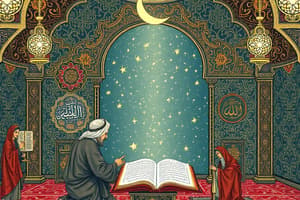Podcast
Questions and Answers
When did the Prophet Muhammad receive revelations from Allah through the angel Gabriel?
When did the Prophet Muhammad receive revelations from Allah through the angel Gabriel?
- 615 CE
- 613 CE
- 622 CE
- 610 CE (correct)
Where did the Muslims migrate to in 615 CE to escape persecution by the Quraysh tribe?
Where did the Muslims migrate to in 615 CE to escape persecution by the Quraysh tribe?
- Abyssinia (Ethiopia) (correct)
- Medina
- Baghdad
- Damascus
Who was the first caliph and known for his role in compiling the Quran?
Who was the first caliph and known for his role in compiling the Quran?
- Uthman ibn Affan
- Abu Bakr (correct)
- Umar ibn Al-Khattab
- Ali ibn Abi Talib
Which caliph oversaw the standardization of the Quran?
Which caliph oversaw the standardization of the Quran?
Who founded the Umayyad Caliphate?
Who founded the Umayyad Caliphate?
What was the capital of the Abbasid Caliphate?
What was the capital of the Abbasid Caliphate?
Who founded the Ottoman Empire?
Who founded the Ottoman Empire?
What was the focus of the Islamic modernism movement in the 18th-20th centuries?
What was the focus of the Islamic modernism movement in the 18th-20th centuries?
Flashcards are hidden until you start studying
Study Notes
Islamic History
Early Years (610-632 CE)
- The Prophet Muhammad (peace be upon him) received revelations from Allah (God) through the angel Gabriel in 610 CE
- Initially, Muhammad preached to his family and close friends, including his wife Khadija
- In 613 CE, Muhammad began to publicly preach Islam in Mecca
- Persecution of Muslims by the Quraysh tribe led to the migration of Muslims to Abyssinia (Ethiopia) in 615 CE
- The Hijra (migration) to Medina in 622 CE marked the beginning of the Islamic calendar
The Rightly-Guided Caliphs (632-661 CE)
- Abu Bakr (632-634 CE): First caliph, known for his role in compiling the Quran
- Umar ibn Al-Khattab (634-644 CE): Second caliph, expanded the Islamic empire through conquests
- Uthman ibn Affan (644-656 CE): Third caliph, oversaw the standardization of the Quran
- Ali ibn Abi Talib (656-661 CE): Fourth caliph, cousin and son-in-law of the Prophet Muhammad
The Umayyad Caliphate (661-750 CE)
- Established by Muawiyah ibn Abi Sufyan, a companion of the Prophet Muhammad
- Capital was moved from Medina to Damascus
- Period of rapid expansion, including the conquest of Spain and North Africa
The Abbasid Caliphate (750-1258 CE)
- Established by Abu al-Abbas as-Saffah, who led a revolution against the Umayyads
- Capital was moved from Damascus to Baghdad
- Golden Age of Islamic civilization, marked by significant scientific, cultural, and philosophical achievements
The Ottoman Empire (1299-1924 CE)
- Founded by Osman Bey, a Turkish tribal leader
- Expanded into Eastern Europe, the Middle East, and North Africa
- Became a major world power, known for its administrative and military systems
Islamic Revival and Modernization (18th-20th centuries)
- Wahhabi movement: Founded by Muhammad ibn Abd al-Wahhab, emphasized the purity of Islam and the importance of the Quran and Hadith
- Islamic modernism: Emerged in response to Western colonialism, emphasized the need for Islamic reform and adaptation to modernity
Islamic History
Early Years (610-632 CE)
- Prophet Muhammad received revelations from Allah through angel Gabriel in 610 CE
- Initially preached to family and close friends, including wife Khadija
- Publicly preached Islam in Mecca from 613 CE
- Persecution by Quraysh tribe led to migration of Muslims to Abyssinia in 615 CE
- Hijra to Medina in 622 CE marked the beginning of the Islamic calendar
The Rightly-Guided Caliphs (632-661 CE)
- Abu Bakr (632-634 CE): First caliph, compiled the Quran
- Umar ibn Al-Khattab (634-644 CE): Second caliph, expanded the Islamic empire through conquests
- Uthman ibn Affan (644-656 CE): Third caliph, standardized the Quran
- Ali ibn Abi Talib (656-661 CE): Fourth caliph, cousin and son-in-law of the Prophet Muhammad
The Umayyad Caliphate (661-750 CE)
- Established by Muawiyah ibn Abi Sufyan, a companion of the Prophet Muhammad
- Capital moved from Medina to Damascus
- Period of rapid expansion, including conquest of Spain and North Africa
The Abbasid Caliphate (750-1258 CE)
- Established by Abu al-Abbas as-Saffah, who led a revolution against the Umayyads
- Capital moved from Damascus to Baghdad
- Golden Age of Islamic civilization, marked by significant scientific, cultural, and philosophical achievements
The Ottoman Empire (1299-1924 CE)
- Founded by Osman Bey, a Turkish tribal leader
- Expanded into Eastern Europe, the Middle East, and North Africa
- Became a major world power, known for its administrative and military systems
Islamic Revival and Modernization (18th-20th centuries)
- Wahhabi movement: Emphasized the purity of Islam and the importance of the Quran and Hadith
- Islamic modernism: Emerged in response to Western colonialism, emphasized the need for Islamic reform and adaptation to modernity
Studying That Suits You
Use AI to generate personalized quizzes and flashcards to suit your learning preferences.




